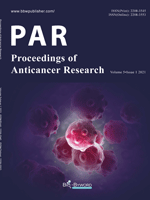Abstract
Hepatocellular carcinoma (HCC) is one of the most common malignant tumors in the world with a high incidence and has become one of the most malignant cancers worldwide. Its clinical treatment mainly includes surgical intervention, chemotherapy, and immunotherapy, with poor curative effect and prognosis. In recent years, with the development of basic research, it has been revealed that protein tyrosine phosphatase receptor-type O (PTPRO) plays an important role in the pathogenesis of hepatocellular carcinoma. Protein tyrosine phosphatase receptor-type O is a new type of protein tyrosine phosphatase, which has been proven to inhibit oncoprotein. In this paper, the potential mechanism of protein tyrosine phosphatase receptor -type O in the progression of hepatocellular carcinoma is discussed to provide reference for clinical treatment and drug development.
References
Li G, Zhang Y, Li G, 2019, Interpretation of ESMO Guidelines for Hepatocellular Carcinoma 2018. Chinese Journal of the Frontiers of Medical Science (Electronic Edition), 11(03): 34-42.
Li D, Liu J, Zhang Y, et al., 2020, Effects of Long Non-coding RNA Mirt2 on Proliferation, Apoptosis, Invasion and Metastasis of Hepatocellular Carcinoma Cells. Anti-Tumor Pharmacy, 10(06): 664-669.
Wang L, Zhao H, Xue B, 2014, Research Progress on the Relationship between Chronic Liver Inflammation and Liver Cancer. World Chinese Journal of Digestology, 22(31): 4757-4761.
Li S, Wu H, Luo R, 2013, Research Progress of PTPRO Gene Methylation and Tumor. Journal of Modern Oncology, 21(10): 2370-2373.
Hou J, Zhang Z, Yan H, 2016, The Role of Epigenetics in Cancer. Chinese Journal of Clinicians (Electronic Edition), 10(18): 2780-2784.
Wang Z, Wang P, Wang Z, et al., 2014, Overview of Molecular Biology of Receptor Type O Protein Tyrosine Phosphatase. Chinese Journal of Clinical Research, 27(12): 1556-1557.
Lei T, Wang Z, 2019, Research Progress of E2F1 in Tumor. Journal of Modern Oncology, 027(014): 2590-2594.
Gou J, Sun P, 2014, STAT3: Key Nodes in Chronic Inflammation-mediated Tumorigenesis and Progression. Progress in Biochemistry and Biophysics, 41(01): 69-78.
Hou J, Xu J, Jiang R, et al., 2013, Estrogen?Sensitive PTPRO Expression Represses Hepatocellular Carcinoma Progression by Control of STAT3. Hepatology, 57(2): 678-688.
Wang M, Li Y, Liu L, et al., 2019, Role and Mechanism of Autophagy in the Pathogenesis and Development of Hepatocellular Carcinoma and the Regulation of Immunotherapy. Journal of Clinical Hepatol, 35(05): 1129-1134.
Feng H, Song X, 2015, Research Progress on the Relationship between Autophagy and Cells in Different Tissues under Obesity. Basic and Clinical Medicine, 35(07): 980-984.
Zhang W, 2016, Mechanism of PTPRO Mediated Autophagy Inhibiting Hepatic Steatosis and Tumorigenesis. Nanjing Medical University.
